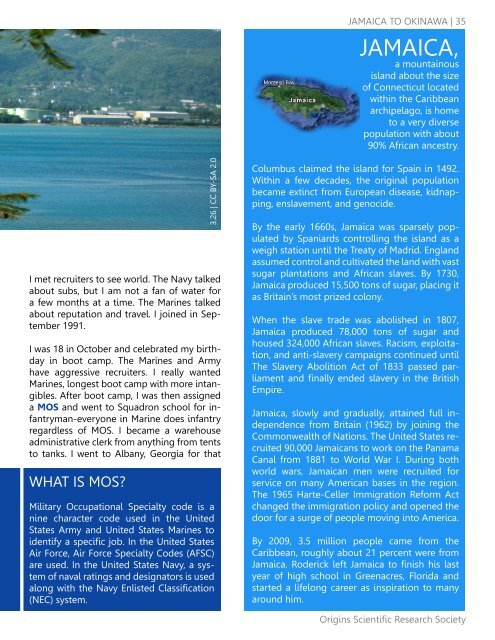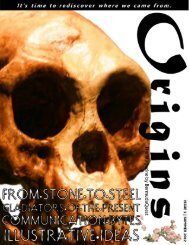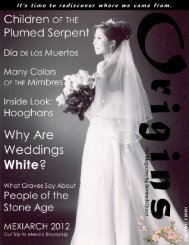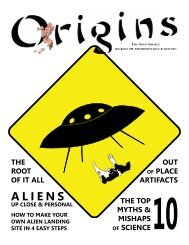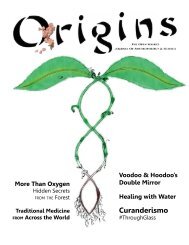Issue 10: Tech from the Military
Exploring how the military shaped the technology many of us depend on or simply desire to use on a daily basis.
Exploring how the military shaped the technology many of us depend on or simply desire to use on a daily basis.
You also want an ePaper? Increase the reach of your titles
YUMPU automatically turns print PDFs into web optimized ePapers that Google loves.
JAMAICA TO OKINAWA | 35<br />
JAMAICA,<br />
a mountainous<br />
island about <strong>the</strong> size<br />
of Connecticut located<br />
within <strong>the</strong> Caribbean<br />
archipelago, is home<br />
to a very diverse<br />
population with about<br />
90% African ancestry.<br />
I met recruiters to see world. The Navy talked<br />
about subs, but I am not a fan of water for<br />
a few months at a time. The Marines talked<br />
about reputation and travel. I joined in September<br />
1991.<br />
I was 18 in October and celebrated my birthday<br />
in boot camp. The Marines and Army<br />
have aggressive recruiters. I really wanted<br />
Marines, longest boot camp with more intangibles.<br />
After boot camp, I was <strong>the</strong>n assigned<br />
a MOS and went to Squadron school for infantryman-everyone<br />
in Marine does infantry<br />
regardless of MOS. I became a warehouse<br />
administrative clerk <strong>from</strong> anything <strong>from</strong> tents<br />
to tanks. I went to Albany, Georgia for that<br />
WHAT IS MOS?<br />
3.26 | CC BY-SA 2.0<br />
<strong>Military</strong> Occupational Specialty code is a<br />
nine character code used in <strong>the</strong> United<br />
States Army and United States Marines to<br />
identify a specific job. In <strong>the</strong> United States<br />
Air Force, Air Force Specialty Codes (AFSC)<br />
are used. In <strong>the</strong> United States Navy, a system<br />
of naval ratings and designators is used<br />
along with <strong>the</strong> Navy Enlisted Classification<br />
(NEC) system.<br />
Columbus claimed <strong>the</strong> island for Spain in 1492.<br />
Within a few decades, <strong>the</strong> original population<br />
became extinct <strong>from</strong> European disease, kidnapping,<br />
enslavement, and genocide.<br />
By <strong>the</strong> early 1660s, Jamaica was sparsely populated<br />
by Spaniards controlling <strong>the</strong> island as a<br />
weigh station until <strong>the</strong> Treaty of Madrid. England<br />
assumed control and cultivated <strong>the</strong> land with vast<br />
sugar plantations and African slaves. By 1730,<br />
Jamaica produced 15,500 tons of sugar, placing it<br />
as Britain’s most prized colony.<br />
When <strong>the</strong> slave trade was abolished in 1807,<br />
Jamaica produced 78,000 tons of sugar and<br />
housed 324,000 African slaves. Racism, exploitation,<br />
and anti-slavery campaigns continued until<br />
The Slavery Abolition Act of 1833 passed parliament<br />
and finally ended slavery in <strong>the</strong> British<br />
Empire.<br />
Jamaica, slowly and gradually, attained full independence<br />
<strong>from</strong> Britain (1962) by joining <strong>the</strong><br />
Commonwealth of Nations. The United States recruited<br />
90,000 Jamaicans to work on <strong>the</strong> Panama<br />
Canal <strong>from</strong> 1881 to World War I. During both<br />
world wars, Jamaican men were recruited for<br />
service on many American bases in <strong>the</strong> region.<br />
The 1965 Harte-Celler Immigration Reform Act<br />
changed <strong>the</strong> immigration policy and opened <strong>the</strong><br />
door for a surge of people moving into America.<br />
By 2009, 3.5 million people came <strong>from</strong> <strong>the</strong><br />
Caribbean, roughly about 21 percent were <strong>from</strong><br />
Jamaica. Roderick left Jamaica to finish his last<br />
year of high school in Greenacres, Florida and<br />
started a lifelong career as inspiration to many<br />
around him.<br />
Origins Scientific Research Society


